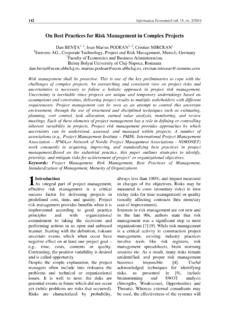Transcription of Core Principles & Values of Effective Team-Based …
1 Core Principles & Values of Effective Team-Based Health Care Pamela Mitchell, Matthew Wynia, Robyn Golden, Bob McNellis, Sally Okun, C. Edwin Webb, Valerie Rohrbach, and Isabelle Von Kohorn*. October 2012. *Participants drawn from the Best Practices Innovation Collaborative of the IOM Roundtable on Value & Science-Driven Health Care The views expressed in this discussion paper are those of the authors and not nec- essarily of the authors' organizations or of the Institute of Medicine. The paper is in- tended to help inform and stimulate discussion. It has not been subjected to the re- view procedures of the Institute of Medicine and is not a report of the Institute of Medicine or of the National Research Council.
2 AUTHORS. Pamela H. Mitchell Sally Okun Past-President, American Academy of Nursing Health Data Integrity and Patient Safety The Robert G. and Jean A. Reid Dean in PatientsLikeMe Nursing (Interim). University of Washington C. Edwin Webb Associate Executive Director Matthew K. Wynia Director, Government and Professional Director, The Institute for Ethics Affairs American Medical Association American College of Clinical Pharmacy Robyn Golden Valerie Rohrbach Instructor and Director of Older Adult Senior Program Assistant Programs Institute of Medicine Rush University Medical Center Isabelle Von Kohorn Bob McNellis Program Officer Vice President, Science and Public Health Institute of Medicine American Academy of Physician Assistants The authors are deeply grateful for the insights and assistance of health care teams at the following institutions.
3 BRIGHTEN at Rush University Cincinnati Children's Family- and Patient-Centered Rounds El Rio Community Health Center Hospice of the Bluegrass MD Anderson Cancer Center Mike O'Callaghan Federal Medical Center Mount Sinai Palliative Care Team Park Nicollet University of Pennsylvania Transitional Care Model Veterans Affairs Patient-Aligned Care Teams Vermont Blueprint for Health Suggested Citation: Mitchell, P., M. Wynia, R. Golden, B. McNellis, S. Okun, Webb, V. Rohrbach, and I. Von Kohorn. 2012. Core Principles & Values of Effective Team-Based health care. Discussion Paper, Institute of Medicine, Washington, DC.
4 Core Principles & Values of Effective Team-Based Health Care Pamela Mitchell, University of Washington; Matthew Wynia, American Medical Association;. Robyn Golden, Rush University Medical Center; Bob McNellis, American Academy of Physi- cian Assistants; Sally Okun, PatientsLikeMe; C. Edwin Webb, American College of Clinical Pharmacy; Valerie Rohrbach, Institute of Medicine (IOM); and Isabelle Von Kohorn, IOM. GOAL. This paper is the product of individuals who worked to identify basic Principles and ex- pectations for the coordinated contributions of various participants in the care process. It is in- tended to provide common reference points to guide coordinated collaboration among health pro- fessionals, patients, and families ultimately helping to accelerate interprofessional Team-Based care.
5 The authors are participants drawn from the Best Practices Innovation Collaborative of the Institute of Medicine (IOM) Roundtable on Value & Science-Driven Health Care. The Collabo- rative is inclusive without walls and its participants are drawn from professional organiza- tions representing clinicians on the front lines of health care delivery; members of government agencies that are either actively involved in patient care or with programs and policies centrally concerned with the identification and application of best clinical services; and others involved in the evolution of the health care workforce and the health professions.
6 Teams in health care take many forms, for example, there are disaster response teams;. teams that perform emergency operations; hospital teams caring for acutely ill patients; teams that care for people at home; office- based care teams; geographically disparate teams that care for ambulatory patients; teams limited to one clinician and patient; and teams that include the patient and loved ones, as well as a number of supporting health professionals. Teams in health care can therefore be large or small, centralized or dispersed, virtual or face-to-face while their tasks can be focused and brief or broad and lengthy.
7 This extreme heterogeneity in tasks, patient types, and settings is a challenge to defining optimal Team-Based health care, including specific guidance on the best structure and functions for teams. Still, regardless of their specific tasks, patients, and settings, Effective teams throughout health care are guided by basic Principles that can be measured, compared, learned, and replicated. This paper identifies and describes a set of core Principles , the purpose of which is to help enable health professionals, researchers, policy makers, administrators, and patients to achieve appropriate, high-value Team-Based health care.
8 THE EVOLUTION OF TEAMS IN HEALTH CARE. Health care has not always been recognized as a team sport, as we have recently come to think of it. In the good old days, people were cared for by one all-knowing doctor who lived in the community, visited the home, and was available to attend to needs at any time of day or night. If nursing care was needed, it was often provided by family members, or in the case of a Participants drawn from the Best Practices Innovation Collaborative of the IOM Roundtable on Value & Science- Driven Health Care. 1. Copyright 2012 by the National Academy of Sciences. All rights reserved.
9 Family of means, by a private-duty nurse who lived in. Although this conveyed elements of teamwork, health care has changed enormously since then and the pace has quickened even more dramatically in the past 20 years. The rapidity of change will continue to accelerate as both clini- cians and patients integrate new technologies into their management of wellness, illness, and complicated aging. The clinician operating in isolation is now seen as undesirable in health care a lone ranger, a cowboy, an individual who works long and hard to provide the care need- ed, but whose dependence on solitary resources and perspective may put the patient at ,2.
10 A driving force behind health care practitioners' transition from being soloists to mem- bers of an orchestra is the complexity of modern health care, which is evolving at a breakneck pace. The National Guideline Clearinghouse now lists over 2,700 clinical practice guide- lines, and, each year, the results of more than 25,000 new clinical trials are No single person can absorb and use all this information. In order to benefit from the detailed information and specific knowledge needed for his or her health care, the typical Medicare beneficiary visits two primary care clinicians and five specialists per year, as well as providers of diagnostic, pharmacy, and other This figure is several times larger for people with multiple chron- ic The implication of these dynamics is enormous.










